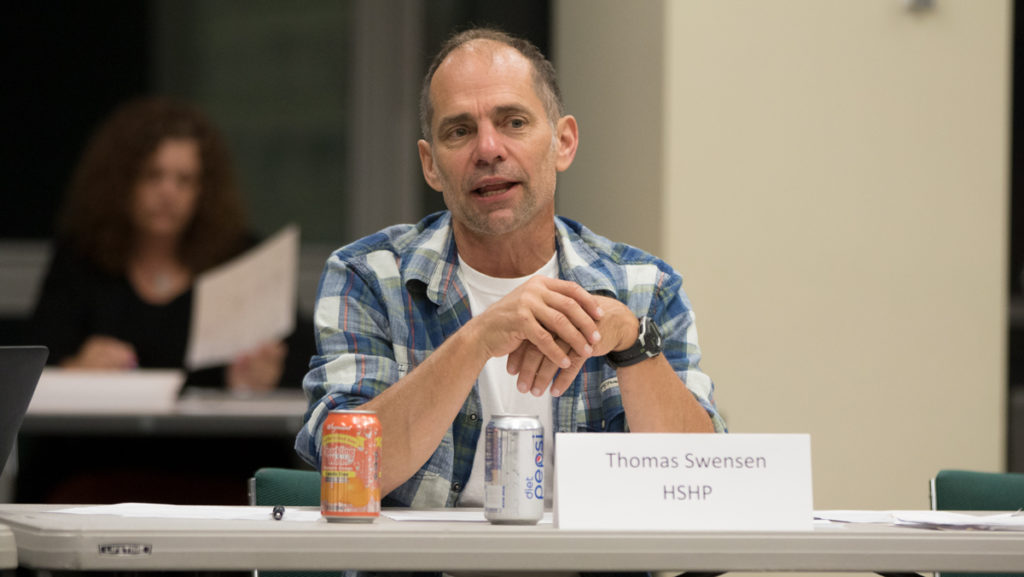The Ithaca College Faculty Council discussed changing language in the Faculty Handbook bylaws at the Oct. 3 meeting that might construct barriers when recruiting and retaining faculty, specifically faculty of color.
The council also discussed the composition of the Faculty Benefits Committee, two Academic Policies Committee changes and approved the new volunteer faculty justices, who help adjudicate cases in which students violate conduct policy. Amending the size of the Faculty Council was also discussed at length, but the council eventually deemed size irrelevant to functionality.
Tom Swensen, Faculty Council chairman and professor and chair in the Department of Exercise and Sport Sciences, said that a goal in the coming year would be to review these bylaws to ensure that there are no built-in biases to recruiting and retaining faculty.
Swensen said this focus on internal biases stemmed from a workshop in August, during which he spoke with Jennifer Jolly, associate professor and chair of the Department of Art History, when she noted the bylaws were written at a time when the college was run primarily by white males.
“Her comment was that, ‘We have a document constructed by a bunch of white males in a patriarchal society where our bylaws were originated,’” Swensen said.
The council spoke about how this may not only concern language but also policy, and an amendment was made to seek external expertise with regard to language in the bylaws that might discriminate against underrepresented groups.
The council also discussed the composition of the Faculty Benefits Committee, which provides consultation and recommendations on benefits for full-time faculty members. The council discussed a motion raised by Rachel Fomalhaut, lecturer in the Department of Writing, to create a position on the committee specifically for a part-time faculty member. A point of contention emerged about the purpose of the part-time faculty position. Some were concerned and whether the part-time faculty members would weigh in on the allocation of benefits for full-time faculty members or lobby to receive benefits from the college for other part-time faculty. The idea was subsequently tabled. As previously reported by The Ithacan, part-time faculty members currently receive a bus pass, free parking and full access to the library as benefits, but do not have a retirement package or health care plan.
Fomalhaut said that regardless of a part-timer’s purpose for being on the committee, there is value in having a part-time faculty member on the FBC.
“To me, the key here is that part-time faculty are going to have a very important perspective on benefits that full-time faculty may not have,” Fomalhaut said.
Devan Rosen, associate professor and emerging media program director in the Department of Media Arts, Sciences and Studies, said that although he is not against adding a part-time faculty position, he does not fully understand the relevance of having a part-time faculty member who has no benefits on a committee that discusses benefits for full-time faculty.
“From an organizational perspective, I’m having trouble thinking through an employee lobbying for something that other employees are getting,” Rosen said.
The council also approved a range of other motions including the new volunteer faculty justices and two Academic Policies Committee policy changes. Now, when students have an issue with a grade, the dispute should stay between the faculty member and the student. Previously, the policy stated that the Office of the Registrar would be involved, according to a document released by the APC.
Linda Petrosino, provost and vice president of educational affairs, opened the meeting by discussing the upcoming all-faculty meeting which will be held at 8 a.m. Oct. 26 in the Emerson Suites. An all-staff meeting will take place the week before at 8 a.m. Oct. 18 in the Emerson Suites. Both meetings will be preceded by a breakfast, at 8 a.m. and the dialogue portion will begin at 8:30 a.m.
Petrosino said that she also met with Rosanna Ferro, the newly appointed vice president of the Division of Student Affairs, and that she is optimistic about Ferro’s future impact on the college. Ferro, one of the current associate deans at Williams College, was directly appointed by Collado without a formal search to the position. The division was reinstated by Collado Sept. 21.
“I feel that she is going to be a strong partner for the campus, a strong partner for student affairs and academic affairs, and I am excited about having the opportunity to continue to work with her,” Petrosino said.
As the college is going through a flurry of changes with a new administration, Petrosino encouraged faculty members to continuously weigh in.
“Please, lend your input as you’re having these conversations,” Petrosino said. “Don’t be standing there on the sidelines saying, ‘No one asked me.’”









